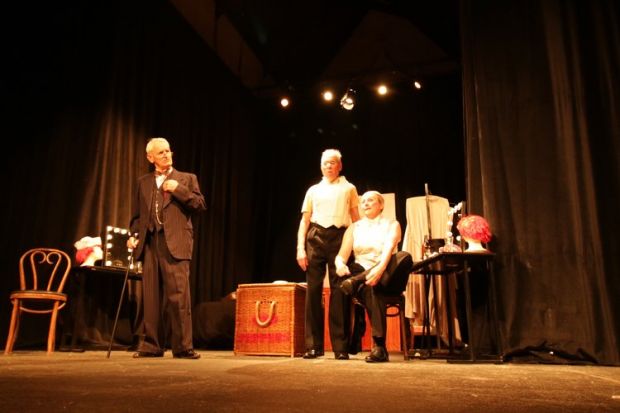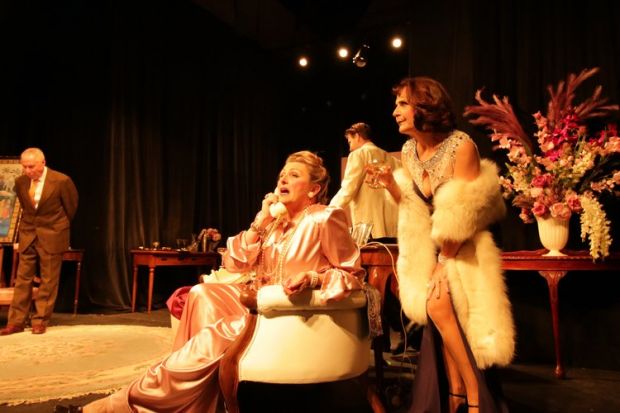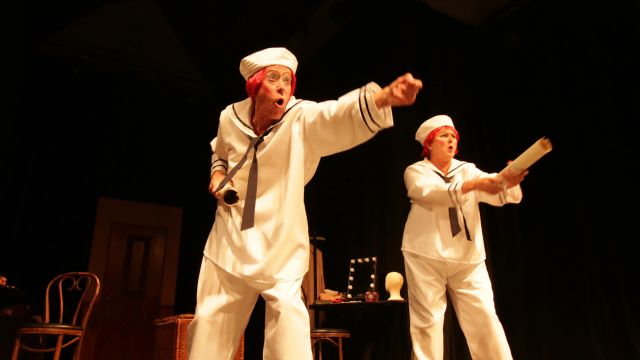Cowardy, Cowardy Custard
The partnership of man about town and retired media identity, and multi-faceted producer, director, costumer and actor Martha Lott has once again seen a totally different choice of play by Holden Street Inc.; this time, 50 years after his death, to entertain and celebrate legendary Noël Coward’s work.
Whilst Coward may be best known for full length comedies like Hay Fever and Blithe Spirit where Coward presented himself as a message-free entertainer, he was an unapologetic preacher and often a scathing satirist, particularly in plays written between the late 1920’s and the end of World War 2. Many of his works were written to showcase his partnership with Gertrude Lawrence and this is evident, particularly in the first play. Amongst his works is a series of nine one act plays in a suite called Tonight at 8.30, and Red Peppers and Hands Across The Sea, two vastly different pieces, are presented in Cowardy, Cowardy Custard.

Interestingly, while Coward is associated with ‘laugh out loud’, or at least genteel tittering, his early pieces strongly condemned social convention, sexual repression and upper-class philistinism. There is also no doubt that the term ‘upper class twit’ in some part was born in Coward’s sitting rooms.
Goers heads his ensemble with two professional actors, Geoff Revell and Martha Lott. Both are masters of physical comedy and have impeccable timing, seemingly effortlessly mastering vastly different accents and, in Revell’s case, side splitting painful silence that left the audience giggling uncontrollably. I would see the show again just to enjoy Lott ‘clipping the daylight’ out of words like ‘horspitality’.

Red Peppers is an insight into the seedy, grubby life of music halls. Revell and Lott as George and Lily Pepper, have the saddest collection of grubby bits of tat and their much-worn underwear may have seen another life in a different century. The show opens with Red Peppers performing ‘Has Anybody Seen Our Ship’, the two singing and dancing with abandon then segueing into a run of delightful groan-worthy vaudeville one liners. Lott and Revell are a coarse cockney, low on the bill couple. They bicker, they fight, they make up. She is an unrepentant ribald feminist before her time. He is desperate to be a star when vaudeville was fighting the onslaught of movies. Several actors make brief appearances and the standout is Rebecca Kemp, a diva, with a capital D, who has ‘emotional scenes.’ She was just warming up for the next play.

Coward always had a stock of predictable characters and Hands Across The Sea has the required handsome young man. David Arcidiaco as a Lt Corbett, looks like a 1930’s matinee idol. He is also frivolous and possibly somewhat dim. Enter the older wiser male character, a Commander of the Royal Navy, a ‘what ho’ sort of character, beautifully drawn by John Doherty. Helen Geoffreys is the required ‘vamp’, and having played that sort of character in an earlier production of Hay Fever, I appreciated her beautifully gowned, frivolously sexy and over the top Clare. Lott, as ‘Piggie’ is an inattentive human bulldozer. Her conversations are on top note, and only occasionally, does she seem to actually communicate with anyone in the room. She is fabulous.

Enter Christopher Burnham played by Christopher Cordeaux, another Cowardesque handsome young man, Kemp and Revell as the Warhursts, a pucka couple from Malaya. The audience adored Revell and Kemp’s physical comedy. Watching Revell fold himself onto an impossibly small chair whilst looking vaguely terrified and confused, was silent comedy at its best. Kemp, complete with a hat bearing a resplendent feather that has a life of its own, has impeccable comedy timing and her near demise with a telephone cord is a joy to behold. She milks the comedy for the full ‘glass and a half.’ Similarly, Cordeaux harnesses beautiful wordless acting to gingerly wrestle some control by sitting on a tiny footstool, clutching his ever-present roll of plans. His accent is a little haphazard, but that can be forgiven as Revell continues to accidentally be the victim of his roll of impossibly large plans.

Many of the 19th and 20th century writing greats had strong, obvious messages in their works. Coward however, through his wit and by capturing and putting under a microscope the manners of England in the 1930’s reminds us how much has changed, or has it?
If you want a ‘jolly good’ laugh, head down to Holden Street and enjoy the joy of Coward’s clever language and the work of a sparkling troupe of actors.
Jude Hines
Subscribe to our E-Newsletter, buy our latest print edition or find a Performing Arts book at Book Nook.

